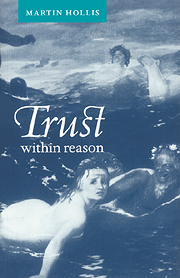8 - Trust in the light of reason
Published online by Cambridge University Press: 06 January 2010
Summary
Progress along the Enlightenment Trail depends on relating Adam and Eve in a way which satisfies the demands of teamwork and which liberals can accept. Since these conditions still threaten to conflict, the trail remains difficult. I shall open the final attempt by thinking about reciprocity and a contrast begun in chapter 6. One idea of it is initially bilateral and, although extendable to a wider circle, retains the idea that debts and obligations must be to the overall benefit of the persons acquiring them. The other is a generalised reciprocity, whose form is that, because A has hurt or helped B, C owes something to D. The conflict springs from trying to read this both universally and locally. Either way corrects the bilateral version but one requires the self to be abstracted and the other embedded. This emerges when the motives of blood donors are considered with the aid of John Rawls' idea of reciprocity, and will lead us to another such idea, one which involves what Rousseau termed ‘a remarkable change in man’. The aim is to make sense of a final hope that citizens in a local community can also be citizens of the world. To achieve it, we must also challenge Condorcet's typical Enlightenment notion of the political and moral sciences, however, before we can hope for a positively free world order. That gives liberals much to fight over as well as for, and the book ends speculatively in recommending trust in the light of reason.
reciprocity
Among mutual back-scratchers, reciprocity is at heart bilateral: you scratch my back and I scratch yours; if you scratched mine yesterday, I owe you one today.
- Type
- Chapter
- Information
- Trust within Reason , pp. 143 - 163Publisher: Cambridge University PressPrint publication year: 1998



